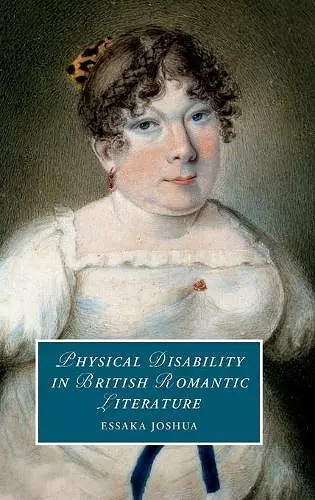Physical Disability in British Romantic Literature
Format:Hardback
Publisher:Cambridge University Press
Published:12th Nov '20
Currently unavailable, and unfortunately no date known when it will be back
This hardback is available in another edition too:
- Paperback£22.99(9781108799171)

This book provides new period-appropriate concepts for understanding Romantic-era physical disability through function and aesthetics.
This book is for Romantic era scholars/students interested in revising their view on major Romantic texts by reading with sensitivity to ideas and concepts around disability; and for literary disability studies' scholars and students wishing to extend their understanding of the eighteenth or nineteenth centuries.The modern concept of disability did not exist in the Romantic period. This study addresses the anachronistic use of 'disability' in scholarship of the Romantic era, providing a disability studies theorized account that explores the relationship between ideas of function and aesthetics. Unpacking the politics of ability, the book reveals the centrality of capacity and weakness concepts to the egalitarian politics of the 1790s, and the importance of desert theory to debates about sentiment and the charitable relief of impaired soldiers. Clarifying the aesthetics of deformity as distinct from discussions of ability, Joshua uncovers a controversy over the use of deformity in picturesque aesthetics, offers accounts of deformity that anticipate recent disability studies theory, and discusses deformity and monstrosity as a blended category in Frankenstein. Setting aside the modern concept of disability, Joshua cogently argues for the historical and critical value of period-specific terms.
'Joshua uses writing about disability and disability theory to bring a new perspective to her analysis of these texts. As a result, this is an important contribution to literary criticism of the Romantic era. There is a larger historical significance too in her careful reading of the nuance of language and the evolution of terminology we use in our discussions of disability history.' Rosamund Oates, H-Disability
'Joshua's book demonstrates the need for scholars studying topics as wide-ranging as Jacobin politics and novels, proto-feminist writing, the Romantic encounter poem, aesthetics, the marriage plot, and the gothic to develop and account for historically specific concepts of pre-disability.' Corey Goergen, The Wordsworth Circle
'It is steeped in the intricate minutiae of period-specific group terms around the modern concept of disability. This book has succeeded wonderfully in making the most out of those archival silences in disability history … The greatest contribution of this book is to deepen our understanding of the long history of representation by offering a detailed peek into the unfamiliar language of Romantic-era disability. The historicist warning, however, is well-taken, and writing the history of disabled people will continue to require both Joshua's corrective archive and Sharpe's reparative anachronism.' Fuson Wang, European Romantic Review
'… a deeply researched and thought-provoking examination of Romantic-era representations of physical impairment and nonimpairment.' Paul Kelleher, Modern Philology
'Physical Disability is likely to be a foundational text for Romantic disability studies going forward.' Hannah Chaskin, Keats-Shelley Journal
'... prompts us to more fully and clearly explain how disability emerges and flourishes in literature before the twentieth century.' Paul Kelleher, Modern Philology
'… suggests a road map for Romanticists wishing to delve into the historical relation between disability and the literature of that time. Joshua's study is a salutary reminder of what might be gained or lost by ongoing approaches (including my own) not shying away from a presentism reading the archives of the nineteenth century or earlier.' Orrin N. C. Wang, SEL Studies in English Literature 1500–1900
ISBN: 9781108836708
Dimensions: 240mm x 160mm x 25mm
Weight: 620g
250 pages